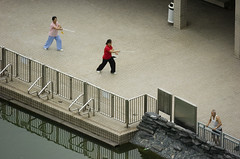how films tell us the way we are
What do movies tell us about what kind of people we are?
Imagine the following: you are an alien from outer space, who is about to get into the space ship to visit planet Earth. Before you leave, you are instructed to learn as much as possible about the people and their culture who live on this planet. Your homework: to watch all the movies produced in the last year.
Think about what kind of image you would get from looking at what kind of movies we produce and watch as people. There is an abundance of Hollywood movies. You might think we are all American. Or that we imagine to be super heroes. So much special effects. How would our lives look like if they were like Hollywood movies? But of course, our lives are most of the time nothing like Hollywood movies.
Showing a movie that just portrays how we are would be boring. Would it not? Ann Hui doesn’t think so. She provocatively titled her latest movie The Way We Are. Ann Hui is perhaps the most gifted story teller in Hong Kong, at least when it comes to film making. The same way Ozu chronicled the lives of Japanese society, Hou Hsiao-hsien and Edward Yang documented the day-and-nights of Taiwanese people growing up, Ann Hui is the cultural biographer of Hong Kong.
When it comes to Hong Kong movies, most people might think of kung-fu stars, like Bruce Lee or Jackie Chan or Jet Li, or perhaps triad movies, made famous by John Woo, and more recently Johnnie To. Some might even think of Wong Kar Wai. But the films of Ann Hui are those who directly go to the core of what Hong Kong is about – but this core is as most of our lives perhaps unspectacular, mundane, and banal.
Ann Hui nevertheless manages to weave an incredibly rich story detailing the mundane lives of people in a part of Hong Kong that is often sensationalized: Tin Shui Wai. It’s a part of town that is considered desolate, characterized by social problems, unemployment, with high buildings (some might think of them as Hong Kong’s version of “the projects”).
What is worth telling here is a story from a part of society that you otherwise would never see or hear. But that they don’t exist in our popular imagination doesn’t mean they exist, and it doesn’t mean that we shouldn’t know about. Most movies have spoiled the way we “consume” them: often slick, highly visualized, with something to grab our attention every three seconds (if not less). This movie by Ann Hui needs to be slowly taken in, with patience.
That is to say, our starting assumption should be that there are really no boring people. That every person has a story to tell, and that when they try to tell you their story, the least you could do is listen to them, with the patience and respect every human being deserves. Because, that’s the way we are. Ann Hui, thank you for reminding us of this important lesson.
(I was compelled to write this review after reading this review on IMDB that I .. slightly disagreed with).
Posted in movies


December 29th, 2008 at 7:48 am
Nice write-up.
January 27th, 2009 at 6:22 am
I’m sorry you got riled up by a review of “The Way We Are” that you read on IMDB but am so glad that it prompted you to write this very neat piece on the film that I actually think may be Ann Hui’s best yet.